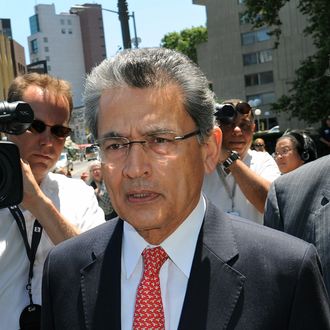
Last week, the insider-trading trial of Rajat Gupta was put on hold while Judge Jed Rakoff consulted a dictionary.
“Integrity,” he said, outside the presence of jurors, “is an ambiguous word. No one uses the first sense of ‘wholeness’ or ‘completeness.’ There is no total mensch.”
Rakoff’s lexicographical aside came after Gary Naftalis, Gupta’s plucky defense lawyer, tried to call a small army of character witnesses to the stand. Having Gupta’s friends, relatives, and colleagues testify about his integrity, Naftalis hoped, would convince jurors that the esteemed Gupta would not, could not have given privileged information to convicted insider trader Raj Rajaratnam.
Gupta did, indeed, have a long list of charitable work. He was, at various times, a trustee of the University of Chicago; a board member of the Global Health Council, the Harvard School of Public Health, and the Weill Cornell Medical College; and an adviser to the Clinton Global Health Initiative and former UN Secretary-General Kofi Annan.
Rakoff allowed six of Gupta’s character witnesses to testify — including his eldest daughter, and a Harvard professor with whom he had worked on an anti-malaria project. But he maintained that Gupta’s charity credentials had, at best, an incomplete bearing on whether or not he had given illicit tips to Rajaratnam.
“A person who might be totally dishonest in numerous ways might still be interested in eradicating malaria,” the judge said.
That statement, obvious as it sounds, cut to the heart of one of Gupta’s defense strategies. During the trial, his lawyers made a motif of the refrain that Gupta, seated in front of his wife and daughters, was above the crime he was accused of — that his sterling reputation in the business world and his commitment to family and charity, was proof enough of his innocence.
And each time, prosecutors would repeat the point Rakoff had made before them: Even crooks can be charitable.
“The annals of white-collar crime in this district are filled with people who wanted to make themselves respected, powerful members of society by giving to charity,” the judge said.
It seemed at times as if the defense hadn’t expected Gupta’s humanitarian work to be given such short shrift. Before his trial, hundreds of Gupta’s friends, colleagues, and peers set up a website, Friends of Rajat, on which they laid paeans to Gupta’s goodness.
“Ten years ago, the Global Fund to Fight AIDS, TB, and Malaria was established to raise funding to control three of the world’s most deadly pandemics,” went one typically glowing testimony. “Rajat Gupta was there from the start, and for the next decade played a leading role in guiding the Global Fund to its position as the world’s largest and most innovative multinational health funder.”
Rajaratnam, who is currently serving a ten-year prison sentence, tried the good-guy strategy, too. During his trial, lawyers called Geoffrey Canada, the Harlem Children’s Zone head and beloved star of Waiting for “Superman”, to testify about Rajaratnam’s “extraordinary” support for education initiatives in the city.
New York is full of prominent philanthropists who have come under fire for business misdeeds. Nobody, for example, is demanding that John Thain, the controversial former Merrill Lynch head who became a target of populist rage after the financial crisis, take his name off the Carmen and John Thain Center for Prenatal Pediatrics at the Morgan Stanley Children’s Hospital. Kathleen Fuld — wife of Lehman Brothers CEO Richard — is still a trustee at the MoMa. Of course, neither Thain nor Fuld has been accused of breaking the law.
When it comes to evaluating accused white-collar criminals, New Yorkers seem capable of evaluating legality apart from character. For law-and-order advocates, that’s a good thing; for Gupta’s numerous friends and inconsolable family members, it’s bad. For the twelve New Yorkers on the Gupta jury who decided that giving to charity doesn’t erase the potential for financial sins, it was simply self-evident.





























